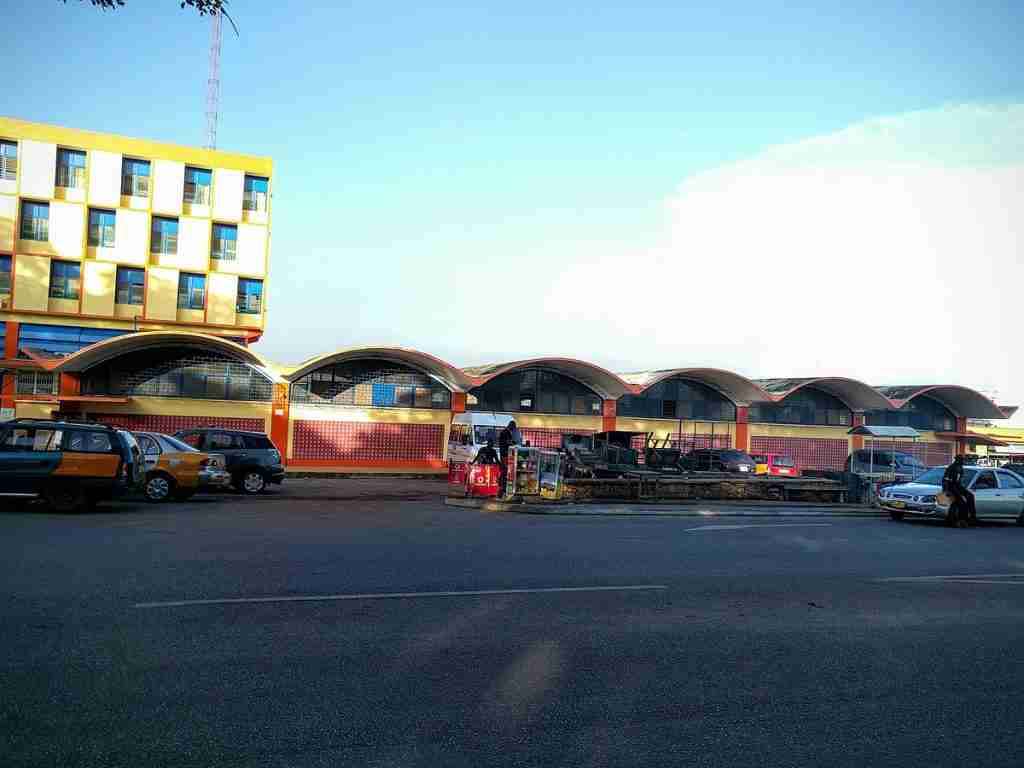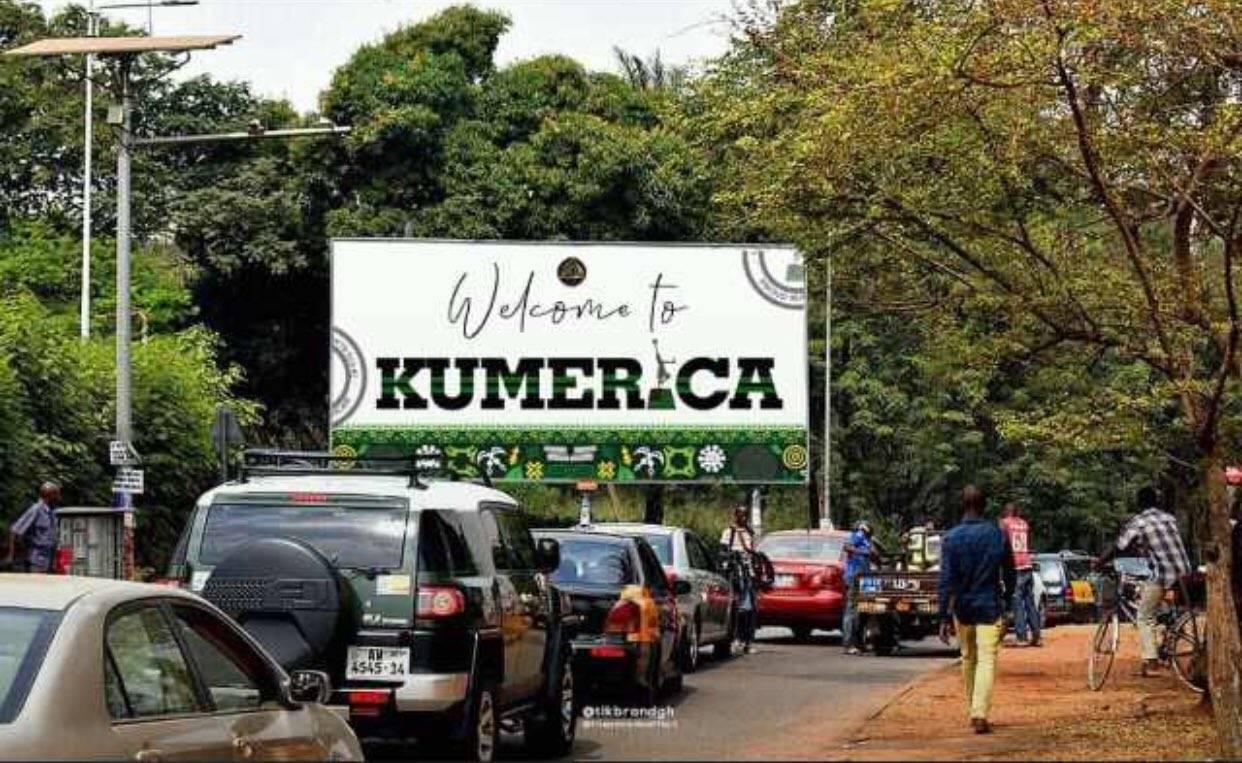Kumasi or (Kumase) is located in a rain forest region near lake Bosomtwe in Ghana in West Africa.

Where is Kumasi Ghana? The city of Kumasi is located in the south-central part of Ghana. A metropolitan area that is the original home of the Asante people. Kumasi is known for its beautiful scenery, which includes a lot of wildlife, lush green vegetation, and rolling hills. This picturesque locale also has a rich history that dates back to at least the 16th century.
Table of Contents
Where is Kumasi – The City’s Geographical Area
Kumasi is the second-largest city in Ghana – about 200 kilometres (100 mi) north of the Gulf of Guinea and approximately 500 kilometres (300 mi) north of the equator.
The city of Kumasi is situated among hills rising more than 1,000 feet (300 metres) high in an area known for its wet, rainy climate. In line with its geographic location, Kumasi has a humid, wet climate.
Located on the north-south trade routes of Ghana, Kumasi is known for its huge markets and trading over the years casting no doubt on this ancient city as a major commercial centre.
Where is Ghana?
Ghana is a country in West Africa. It shares borders with Côte d’Ivoire to the west, Burkina Faso to the north, Togo to the east and has a small coastline on the Gulf of Guinea in the south. It covers an area of 238,535 square kilometers and has a population of around 27 million people. The capital city is Accra, while its other major cities include Kumasi and Cape Coast. Ghana ranges from dense lowland forest to savanna and wetlands
How to get to Kumasi
How do I get to Kumasi Ghana?
You can fly to Kumasi, Ghana from all the major cities in Ghana and other parts of the globe.
Kumasi can be accessed by air or by bus from the capital city. The average airfare from Accra to Kumasi is less than $50, mostly between $20 and $40. A bus fare is approximately $10 or even less depending on your choice of bus.
How long did it take to get to Kumasi Ghana?
Kumasi, the capital of the Ashanti Region of Ghana, is located about 80 miles northeast of Accra. Driving to Kumasi from Accra is approximately three hours. Bus or public transport takes about 3 to 4 hours. A flight will take approximately 45minutes from Accra to Kumasi.
How much is the flight to Kumasi Ghana?
Flight tickets will vary for different airlines but it’s worth checking a few out to see what they charge for checked-in baggage too.
However, the average airfare from Accra to Kumasi is less than $50, mostly between $20 and $40 as I’ve mentioned earlier.
There are a number of airlines that fly to Kumasi so you’ll either make a choice looking at the value, preference of airline, or a touch of both.
Passion Air and Africa World Airlines Limited are the most recognized players, though there may be others – it’s only a search away.
What is the best price for a return flight from Kumasi to Accra?
Skyscanner revealed that the lowest price for a flight between Kumasi and Accra is £63. The full month’s average price was calculated by adding together all ticket prices during this time.
How long does it take to fly from Kumasi to Accra?
The average flight time from Kumasi to Accra is 40 minutes barring any unforeseen delays and issues.
How many flights are there a week from Kumasi to Accra?
As of January, there were 41 flights every week flying from Kumasi to Accra according to Skyscanner. So there are around 50-ish flights on this route during the week.
How to get from the airport to the Kumasi city center?
The easiest and fastest transportation to town is a taxi. You’ll notice them outside the baggage claim area waiting for fares. The fare should be about $10-$15 depending on your destination in town. If you’re looking to save some money though, Uber can also work as an option. Expect to pay between $5 -$8 per trip.
Note that these drivers don’t use meters – they prefer fixed fees, so ensure you have a mutually agreeable price before you get in to avoid any unpleasant surprises later!
You can also rent a car at the airport if you want to explore more of Kumasi’s sights. There are plenty of rental companies available but I’d recommend using one with local knowledge because it will make things easier when navigating around the city.
That said, many of the attractions in Kumasi are quite detached from each other and require transport or walking for most people. So unless you have specific plans, I wouldn’t suggest renting a car just yet.
When reserving your accommodation – be it a hotel, rest house, Airbnb, etc. – it’s imperative that you double-check if they provide flight transfer services. In Kumasi, it’s not standard, but, if you can, take advantage of that.
Numerous travel agents and concierge groups around can assist you to get around the city, so if you’re looking for more information to help you orient yourself, all you need to do is look up an online travel agency.
What language do they speak in Kumasi Ghana?
The predominant language in Kumasi is Twi which is spoken by all the Akan ethnic groups.
However, you’ll hear Asante-Twi the most popular kind of the broad Twi language spoken by the Asantes widely spoken everywhere in Ghana.
The Twi language is also one of the official languages of Ghana.
There are about 250 different languages spoken in Ghana, and Kumasi is home to the Twi language.
Twi has influenced many languages across West Africa and even the world in places like Jamaica, and there are many Bantu and Mande roots in this dialect as well.
Economy of Kumasi
Ghana’s second-largest capital city, Kumasi is considered to be one of the fastest-growing cities in southern Africa. As the capital of the Asante Empire, Kumasi was once home to a wealthy gold belt.
In most part of the 19th century, it became an important trading center for other African nations during the colonial era, because of the country’s rich natural resources. Today, it still attracts people from other countries because of its prosperity and growth potential.
The economy of Ghana has been growing at a rate of about 6% annually since 2000. This rapid economic development has led to increased demand for housing, education, health care, transportation, communication services, energy, water supply, sanitation, and social infrastructure.
Map of Kumasi
Kumasi is the capital of the Ashanti Region in Ghana. The city has a population of 3,490,000 people according to the 2021 population census.
Located about halfway between Accra and Cape Coast on the north coastal plain near the Gulf of Guinea.
The Climate in Kumasi
The climate in Kumasi, Ghana is very hot and humid throughout the year with the exception of one or two months that see some precipitation. March is the hottest month of the year.
The rainy season starts from anywhere from April through June to October depending on various reasons. August is the coolest month of the year.
however, the weather over the last decade makes nonsense of any whether forecast o prediction. Crazy weather conditions can crop in anytime in recent times.
The average high temperature is around 95°F (35°C) and the average low temperature at night is around 75°F (28°C). This means that the temperatures remain to be tropical during the day and it doesn’t cool down much at night. The humidity level can also reach up to 97%, which makes for a muggy environment in recent years when there are no rains.
History of Kumasi
Kumasi is the administrative capital of the Ashanti Region and the second-largest city in Ghana. The city also remains the seat of the traditional Asante Kingdom with its establishment around the late 17th century. It was given the accolade the ‘Garden City of West Africa’ in the 1940s due to its greenery cityscape.
Kumasi has a rich history that the people are really proud of.
Not only Ashanti people living in Kumasi today. Of course, many of them are Asantes – descendants of the people who lived here centuries ago, but the city is now a metropolitan area with people from diverse backgrounds.
The population of Kumasi
Approximately three million people live in Kumasi.
The population of Kumasi is 3,490,000 people, according to the census of the year 2021. The majority of the population in Kumasi are made up of people of the Akan ethnicity, followed by northerners and other tribes in Ghana. Kumasi has a population density of around 4,858 inhabitants per square kilometer.
The density of Kumasi is very high compared to other cities in Ghana, and in West Africa. The average per capita income of Kumasi is $1,929, which is higher than the national average of $1,541. The population of Kumasi is increasing rapidly, with a population increase of about 6,390 people per year.
Kumasi’s economy is growing at a rapid pace.
The gross domestic product of Kumasi has increased by close to 20%, from $824.7 million in 2010 to about $972.4 million in 2012. The economic growth of Kumasi can be attributed to the growth of the manufacturing sector, telecommunications, as well as the increasing number of local and regional businesses in the city.
The average life expectancy for a male in Kumasi is 69 years old, and the average life expectancy for a female in Kumasi is 70 years old. Kumasi has a relatively younger population which shows that there are many opportunities available for young men and women who want to start their own business or work in an office environment.
What are the top attractions in and around Kumasi?
Thousands of people visit Kumasi, Ghana each year. Kumasi is one of the most historic places in Southern Ghana and is home to the Asante tribe. The Asantes are an ethnic group that has resided in the region for hundreds of years, making it a fascinating destination for travelers interested in exploring African culture, spirituality, and history. There are many historic buildings and sites for tourists to visit when they come to Kumasi.
Some top attractions in and around Kumasi are:
- Manhyia Palace
- Komfo Anokye Sword
- The military Museum
- Centre for National Culture
- Kejetia Market
- Kumasi Zoo
- Lake Bosomtwe
- Patakro shrine
- Adinkra cloth printing in Ntonso
- Adanwomase Kente Village
- Bonwire Kente Village
- Ahwiaa Woodcarving Village
Frequently Asked Questions (FAQs)
What language do they speak in Kumasi Ghana?
The language spoken in Kumasi is Twi, which is also one of the official languages of Ghana. This particular dialect of Twi belongs to the Akan ethnic group, and it is widely spoken almost everywhere in Ghana.
How safe is Kumasi Ghana?
Despite its beautiful scenery and hospitality, you’ll experience in Kumasi and by extension the Ghanaian people, there are certain parts of town that you should be careful to avoid on your travels to Kumasi just like anywhere in the world. For instance, don’t go to places that the locals themselves won’t go for obvious reasons. All you have to do is ask. There are dangerous areas anywhere in the world. Ask for help if you need one.
Is Kumasi Ghana poor?
Yes, Ghana is believed to be a 3rd world country and supposedly poor when compared to the west especially. However, the truth of the matter is that most Ghanaians especially in big cities which includes the people of Kumasi are not necessarily poor. There are serious economic issues that face Ghana and most of them are in relation to the rural-urban contrast we see today. But you’ll be surprised by the urban lifestyle and standard of living of the average person in Kumasi or Accra especially.
Parting words:
Overall, there are many interesting facts about the place known as Kumasi Ghana.
It is one of the largest cities in West Africa. It is always lit with cultural activities unique and very dear to the heart of the people.
Kumasi meets many different cultures as well as religions, reflecting its long history as a human settlement. There are many tours available to learn more about the history and culture of this place.
Also Read:
The Complete Travel Guide To Kumasi. What to Expect!
Time in Kumasi: What time is it in Kumasi, Ghana? [MUST READ]
Expat Guide to Kumasi: The Well-Known And The Secret Unknowns!



